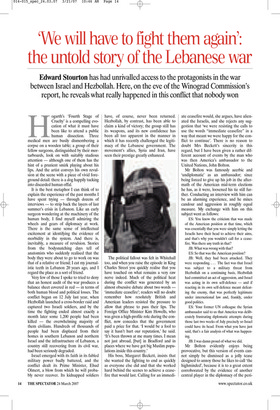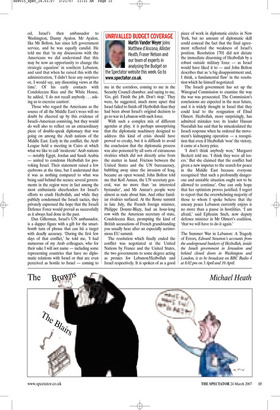‘We will have to fight them again’:
the untold story of the Lebanese war Edward Stourton has had unrivalled access to the protagonists in the war between Israel and Hezbollah. Here, on the eve of the Winograd Commission’s report, he reveals what really happened in this conflict that nobody won Hogarth’s ‘Fourth Stage of Cruelty’ is a compelling evocation of what it must have been like to attend a public human dissection. Three medical men are busily dismembering a corpse on a wooden table; a group of their fellow surgeons, distinguished by their mortarboards, look on with suitably studious attention — although one of them has the hint of a prurient smirk playing about his lips. And the artist conveys his own revulsion at the scene with a piece of vivid foreground detail: there is a dog happily tucking into discarded human offal.
It is the best metaphor I can think of to explain the experience of the past months I have spent trying — through dozens of interviews — to strip back the layers of last summer’s crisis in Lebanon. Like an early surgeon wondering at the machinery of the human body, I find myself admiring the wheels and gears of diplomacy at work. There is the same sense of intellectual excitement at identifying the evidence of morbidity in the system. And there is, inevitably, a measure of revulsion. Stories from the bodysnatching days tell of anatomists who suddenly realised that the body they were about to go to work on was that of a relative or friend; I cut my journalistic teeth in Lebanon 20 years ago, and I regard the place as a sort of friend.
Very few of those I spoke to tried to deny that an honest audit of the war produces a balance sheet covered in red — in terms of both human blood and political losses. The conflict began on 12 July last year, when Hezbollah launched a cross-border raid and captured two Israeli soldiers, and by the time the fighting ended almost exactly a month later some 1,200 people had been killed — the overwhelming majority of them civilians. Hundreds of thousands of people had been displaced from their homes in southern Lebanon and northern Israel and the infrastructure of Lebanon, a country still recovering from its civil war, had been seriously degraded.
Israel emerged with its faith in its fabled military power badly battered, and the conflict dealt its Prime Minister, Ehud Olmert, a blow from which he will probably never recover. Its kidnapped soldiers have, of course, never been returned. Hezbollah, by contrast, has been able to claim a kind of victory; the group still has its weapons, and its new confidence has been all too apparent in the manner in which it has recently challenged the legitimacy of the Lebanese government. The movement’s allies, Syria and Iran, have seen their prestige greatly enhanced.
The political fallout was felt in Whitehall too, and when you raise the episode in King Charles Street you quickly realise that you have touched on what remains a very raw nerve indeed. Much of the political heat during the conflict was generated by an almost obsessive debate about two words — ‘immediate ceasefire’; readers will no doubt remember how resolutely British and American leaders resisted the pressure to allow that phrase to pass their lips. The Foreign Office Minister Kim Howells, who was given a high-profile role during the conflict, now concedes that the government paid a price for that. ‘I would be a fool to say it hasn’t hurt our reputation,’ he said. ‘It’s been thrown at me many times. I mean not just abroad, [but] in Bradford and in places where we have got big Muslim populations inside this country.’ His boss, Margaret Beckett, insists that she wanted the fighting to end as quickly as everyone else did and that she worked hard behind the scenes to achieve a ceasefire that would last. Calling for an immedi ate ceasefire would, she argues, have alienated the Israelis, and she rejects any suggestion that ‘we were resisting the calls to use the words “immediate ceasefire” in a way that meant we were happy for the conflict to continue’. There is no reason to doubt Mrs Beckett’s sincerity in this regard, but I have been given a rather different account of events by the man who was then America’s ambassador to the United Nations, John Bolton.
Mr Bolton was famously acerbic and ‘undiplomatic’ as an ambassador; since being forced to give up his job in the aftermath of the American mid-term elections he has, as it were, loosened his tie still further. Conducting an interview with him can be an alarming experience, and he mixes candour and aggression in roughly equal measure. My exchange with him on this subject went as follows:
ES: You know the criticism that was made of the American position at that time, which was essentially that you were simply letting the Israelis have their head to achieve their aims, and that’s why you wouldn’t call for a ceasefire. Was there any truth in that?
JB: What was wrong with that?
ES: So that was the American position?
JB: Well, they had been attacked. They were responding.... The fact was that Israel was subject to a military threat from Hezbollah on a continuing basis, Hezbollah had committed an act of aggression, and Israel was acting in its own self-defence — and if reacting in its own self-defence meant defeating the enemy, that was perfectly legitimate under international law and, frankly, under good politics.
ES: Your former UN colleague the Syrian ambassador said to us that America was deliberately frustrating diplomatic attempts during those last two weeks of July precisely so Israel could have its head. From what you have just said, that’s a fair analysis of what was happening.
JB: I was damn proud of what we did.
Mr Bolton evidently enjoys being provocative, but this version of events cannot simply be dismissed as a jolly tease designed to annoy those he likes to call ‘the highminded’, because it is to a great extent corroborated by the evidence of another central player in the diplomacy of the peri od, Israel’s then ambassador to Washington, Danny Ayalon. Mr Ayalon, like Mr Bolton, has since left government service, and he was equally candid. He told me that ‘in my discussions with the Americans we did understand that this may be now an opportunity to change the strategic equation’ in southern Lebanon, and said that when he raised this with the administration, ‘I didn’t hear any surprises or, I would say, any dissenting views at the time’. Of his early contacts with Condoleezza Rice and the White House, he added, ‘I do not recall anybody ... asking us to exercise caution’.
Those who regard the Americans as the source of all the Middle East’s woes will no doubt be cheered up by this evidence of Israeli–American conniving, but they would do well also to reflect on an extraordinary piece of double-speak diplomacy that was going on among the Arab nations of the Middle East. Early in the conflict, the Arab League held a meeting in Cairo at which what we like to call ‘moderate’ Arab nations — notably Egypt, Jordan and Saudi Arabia — united to condemn Hezbollah for provoking Israel. Their statement raised a few eyebrows at the time, but I understand that it was as nothing compared to what was being said behind the scenes; several governments in the region were in fact among the most enthusiastic cheerleaders for Israel’s efforts to crush Hezbollah, and while they publicly condemned the Israeli tactics, they privately expressed the hope that the Israeli Defence Force would prevail as successfully as it always had done in the past.
Dan Gillerman, Israel’s UN ambassador, is a dapper figure with a gift for the smartbomb turn of phrase that can hit a target with deadly accuracy. ‘During the first few days of that conflict,’ he told me, ‘I had numerous of my Arab colleagues, who for their sake I will not name — including some representing countries that have no diplomatic relations with Israel or that are even perceived as hostile to Israel — coming to me in the corridors, coming to me in the Security Council chamber, and saying to me, ‘Go, girl. Finish the job. Don’t stop.’ They were, he suggested, much more upset that Israel failed to finish off Hezbollah than they had been about Israel’s original decision to go to war in Lebanon with such force.
With such a complex mix of different agendas at play, it is perhaps unsurprising that the diplomatic machinery designed to address this kind of crisis should have proved so creaky, but it is difficult to avoid the conclusion that the diplomatic process was also poisoned by all sorts of extraneous rivalries which did not directly arise from the matter in hand. Friction between the United States and the UN bureaucracy, bubbling away since the invasion of Iraq, became an open wound; John Bolton told me that Kofi Annan, the UN secretary general, was no more than ‘an interested bystander’, and Mr Annan’s people were almost as rude about him. And other familiar rivalries surfaced. At the Rome summit in late July, the French foreign minister, Philippe Douste-Blazy, had an hour-long row with the American secretary of state, Condoleezza Rice, prompting the kind of British accusations of French grandstanding you usually hear after an especially acrimonious EU summit.
The resolution which finally ended the conflict was negotiated at the United Nations by France and the United States, the two governments to some degree acting as proxies for Lebanon/Hezbollah and Israel respectively. It is spoken of as a good piece of work in diplomatic circles in New York, but no amount of diplomatic skill could conceal the fact that the final agreement reflected the weakness of Israel’s position. Resolution 1701 did not dictate the immediate disarming of Hezbollah by a robust outside military force — as Israel would have liked it to — and John Bolton describes that as ‘a big disappointment and, I think, a fundamental flaw’ in the resolution which he himself negotiated.
The Israeli government has set up the Winograd Commission to examine the way the war was prosecuted. The Commission’s conclusions are expected in the near future, and it is widely thought in Israel that they could lead to the resignation of Ehud Olmert. Hezbollah, more surprisingly, has admitted mistakes too; its leader Hassan Nasrallah has said that he miscalculated the Israeli response when he ordered the movement’s kidnapping operation — a recognition that even if Hezbollah ‘won’ the victory, it came at a heavy price.
‘I don’t think anybody won,’ Margaret Beckett told me. ‘I think they were all losers.’ But she claimed that the conflict had given a new impetus to the search for peace in the Middle East because everyone recognised ‘that such a profoundly dangerous and unstable situation ought not to be allowed to continue’. One can only hope that her optimism proves justified. I regret to report that the overwhelming majority of those to whom I spoke believe that the uneasy peace Lebanon currently enjoys is no more than a pause in hostilities. ‘I am afraid,’ said Ephraim Sneh, now deputy defence minister in Mr Olmert’s coalition, ‘that we will have to do it again.’ The Summer War in Lebanon: A Tragedy of Errors, Edward Stourton’s accounts from the underground bunkers of Hezbollah, inside the Israeli government in Jerusalem and behind closed doors in Washington and London, is to be broadcast on BBC Radio 4 at 8.02 pm on 3 April and 10 April.



















































































 Previous page
Previous page